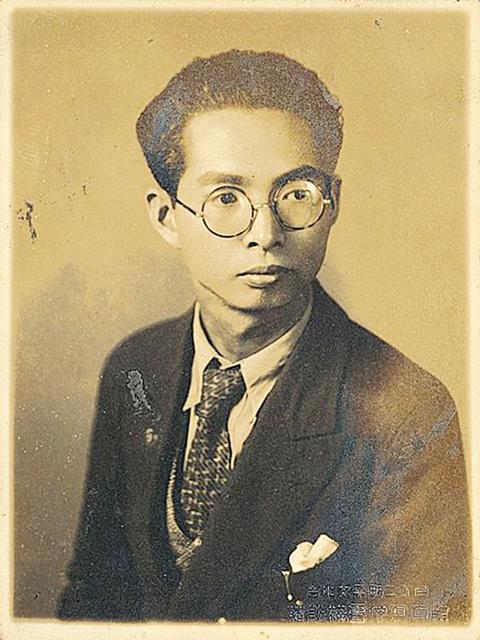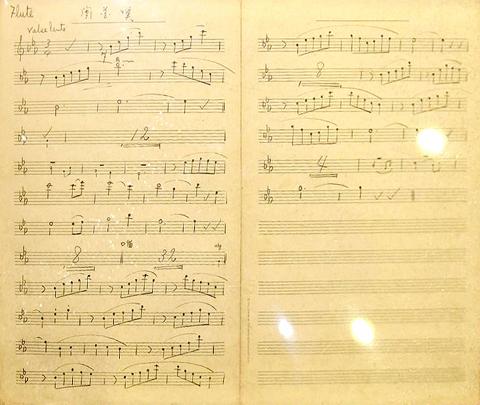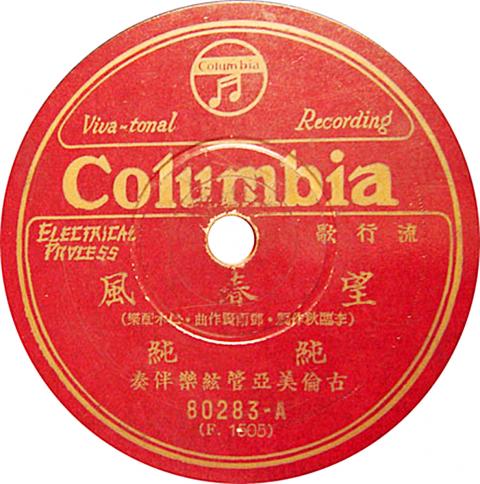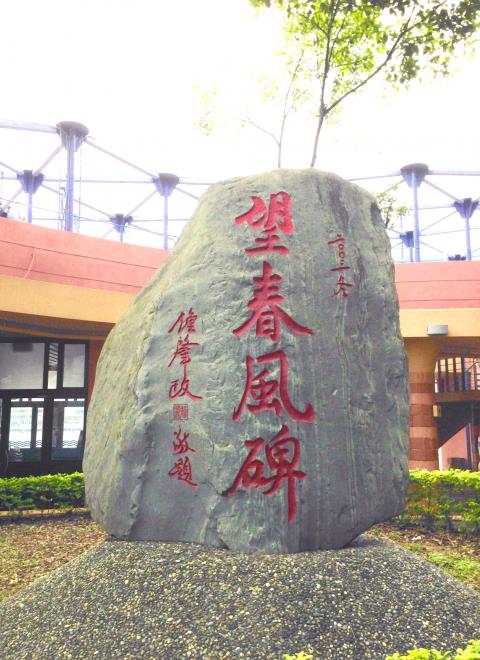June 5 to June11
It was the late 1930s and Teng Yu-hsien (鄧雨賢) was unhappy with what the Japanese colonial government had done to his hit Hoklo (commonly known as Taiwanese) songs Flowers in a Rainy Night (雨夜花), Yearning for Spring (望春風) and Sadness in a Moonlit Night (月夜愁). It had only been a few years since he shot to fame as one of Taiwan’s top four Hoklo pop composers as an in-house musician for the Japanese-run, Taipei-based Columbia Records.
The Hoklo music scene was thriving before the government launched its Japanization policy around 1937. But after the policy shift, not only was Teng stifled creatively, his top three hits had been rewritten into the Japanese military marching songs Calling of the Earth, The Honorable Soldier and The Soldier’s Wife, respectively. It wasn’t just the lyrics, as no trace of the original wistful and romantic arrangement was left.

Photo courtesy of Wikimedia Commons
In addition, during the early 1930s, Teng had spent considerable time traveling throughout Taiwan, doing field research on traditional folk music that he had hoped to incorporate into his work. With strict regulations on melody and lyrics under the new rules, all his effort was for naught.
A frustrated Teng quit his job in 1940 and moved his family to what is today’s rural Hsinchu County to teach at an elementary school. He continued to write music, organized a local band and helped with student performances during school fairs. But as the war went on and resources dwindled, Teng’s health worsened, leading to his premature death at age 38.
MUSIC FOR THE MASSES

Photo: Wang Wen-lin, Taipei Times
Teng was born in 1906 to a scholarly Hakka family that followed an ancestral motto: Do not practice medicine, do not serve the government. As a result, Teng, like many in his family, became a teacher. Although he was Hakka, Teng grew up in Taipei, and became fluent in Japanese and Hoklo.
Having been fascinated with music since he was a child, Teng had other aspirations. At the age of 24, he quit his respected teaching post and went to Japan to study music. Although he studied Western music, he wanted to write Hoklo pop songs to appeal to the masses.
“I feel that not only musicians, but painters and writers as well, often feel that art only belongs to themselves,” he said during a conference in 1936. “They distance themselves from the general public and may even look down on them. If possible, I hope that artists can move closer to the people, as it is what they are meant to do.”

Photo courtesy of Wikimedia Commons
“Currently, art in Taiwan has become entertainment for just a portion of white-collar workers. This needs to improve,” he added.
Teng was wary about promoting Western music in Taiwan, as he believed that people were not sophisticated enough to appreciate it.
“We should improve the melodies and lyrics of existing Taiwanese music, such as Taiwanese opera. I’ve been working on this for four or five years already,” he said.

Photos courtesy of Wikimedia Commons
In 1932, he penned the promotional song for the Chinese movie Peach Blossom Weeps Tears of Blood (桃花泣血記), which is widely considered Taiwan’s first Hoklo hit. His other famous tunes were produced in the next few years, and it’s easy to imagine that he would have accomplished much if his life had not been cut short.
LASTING LEGACY
Japan’s defeat in 1945 did not revive Teng’s work. Bent on eradicating Hoklo and Japanese influences and promoting Mandarin, the Chinese Nationalist Party (KMT) banned his songs along with countless others throughout the White Terror period. Still, the songs persisted and never disappeared. A notable event took place during the 1979 Kaoshiung Incident, when Chiu Chui-chen (邱垂貞), a musician and politician who sought to use Hoklo folk songs in his opposition against KMT rule, sang Yearning For Spring during the political protest that turned violent and landed him in jail for four years.
Teng’s name, however, was largely forgotten. According to a report in the Liberty Times (the Taipei Times’ sister newspaper), even in 1996, when Changhua High School named a building “Yu-hsien Hall,” many people questioned why they would choose a “non-famous person.” A music teacher even asked, “Who is Teng Yu-hsien?”
When Teng’s name was finally revived, he was no longer a pop wunderkind. He was instead honored as the “Father of Taiwanese Folk Songs.” In 2006, National Central University’s Lulin Observatory named an asteroid its staff discovered after Teng. His pop songs are now classics that are still frequently covered by modern artists in many languages.
Taiwan in Time, a column about Taiwan’s history that is published every Sunday, spotlights important or interesting events around the nation that have anniversaries this week.

Taiwan has next to no political engagement in Myanmar, either with the ruling military junta nor the dozens of armed groups who’ve in the last five years taken over around two-thirds of the nation’s territory in a sprawling, patchwork civil war. But early last month, the leader of one relatively minor Burmese revolutionary faction, General Nerdah Bomya, who is also an alleged war criminal, made a low key visit to Taipei, where he met with a member of President William Lai’s (賴清德) staff, a retired Taiwanese military official and several academics. “I feel like Taiwan is a good example of

March 2 to March 8 Gunfire rang out along the shore of the frontline island of Lieyu (烈嶼) on a foggy afternoon on March 7, 1987. By the time it was over, about 20 unarmed Vietnamese refugees — men, women, elderly and children — were dead. They were hastily buried, followed by decades of silence. Months later, opposition politicians and journalists tried to uncover what had happened, but conflicting accounts only deepened the confusion. One version suggested that government troops had mistakenly killed their own operatives attempting to return home from Vietnam. The military maintained that the

Before the last section of the round-the-island railway was electrified, one old blue train still chugged back and forth between Pingtung County’s Fangliao (枋寮) and Taitung (台東) stations once a day. It was so slow, was so hot (it had no air conditioning) and covered such a short distance, that the low fare still failed to attract many riders. This relic of the past was finally retired when the South Link Line was fully electrified on Dec. 23, 2020. A wave of nostalgia surrounded the termination of the Ordinary Train service, as these train carriages had been in use for decades

Lori Sepich smoked for years and sometimes skipped taking her blood pressure medicine. But she never thought she’d have a heart attack. The possibility “just wasn’t registering with me,” said the 64-year-old from Memphis, Tennessee, who suffered two of them 13 years apart. She’s far from alone. More than 60 million women in the US live with cardiovascular disease, which includes heart disease as well as stroke, heart failure and atrial fibrillation. And despite the myth that heart attacks mostly strike men, women are vulnerable too. Overall in the US, 1 in 5 women dies of cardiovascular disease each year, 37,000 of them